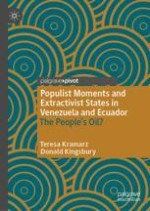2021 | OriginalPaper | Buchkapitel
2. The Limits of Populism as Causal Explanation
verfasst von : Teresa Kramarz, Donald Kingsbury
Erschienen in: Populist Moments and Extractivist States in Venezuela and Ecuador
Aktivieren Sie unsere intelligente Suche, um passende Fachinhalte oder Patente zu finden.
Wählen Sie Textabschnitte aus um mit Künstlicher Intelligenz passenden Patente zu finden. powered by
Markieren Sie Textabschnitte, um KI-gestützt weitere passende Inhalte zu finden. powered by
